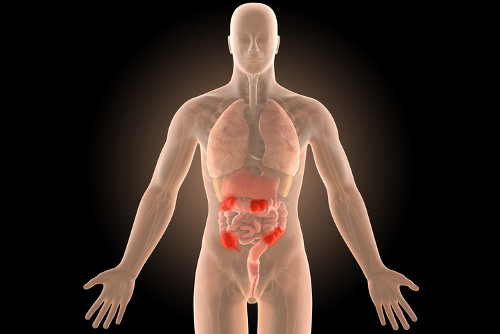
Credit: iStock/EncroVision
Ileocolitis is the most common type of Crohn’s disease that affects the small intestine in nearly half of Crohn’s disease sufferers. Its name comes from the fact that it affects the ileum and colon at the same time.
In this article, we’ll take an in-depth look at ileocolitis complications, as well as ileocolitis diagnosis methods and how to treat it.
What Are the Causes of Ileocolitis?
Unfortunately, no one knows what causes ileocolitis, but there are some factors that can contribute to it occurring. There is some evidence suggesting that a gene called NOD2 or CARD15 can be genetically inherited.
It’s also been noted that age might have something to do with the condition, as most sufferers are affected before they hit the age of 30. It has also been suggested that heavy smoking and certain illnesses might be triggers, but at the moment, there is no concrete evidence.
Ileocolitis Symptoms
How do you recognize ileocolitis? Simply by looking at the symptoms, which usually involve the stomach and intestines. Symptoms can include swelling of the intestines, digestive issues, diarrhea, and abdominal pain. These, in turn, can also cause a loss of appetite, weight loss, and fatigue.
How Is Ileocolitis Diagnosed?
How does your doctor properly diagnose ileocolitis as the symptoms are very similar to many other stomach-based issues? First, the doctor will go through your medical history, as well as ask about your family’s medical history (since it may have a hereditary component). After the initial appointment, the doctor will arrange for you to have some tests.
1. Blood Test
You will be asked to do a blood test to assess your current medical condition.
2. Stool Sample
A stool sample will help also rule out other potential medical issues.
3. Colonoscopy
A camera is fed into your digestive tract to observe any inflammation that may be taking place. This test will confirm a diagnosis.
4. Barium Enema
In this test, a liquid containing a dye is shot up your rectum to get a proper view of the bowels and digestive system. It is the best test to diagnose this condition accurately.
Ileocolitis Treatment Tips
Now that you know how ileocolitis is diagnosed, it’s time to move on to treating the disease. Prescription drugs like aminosalicylates, azathioprine, sulfasalazine, and corticosteroids effectively control the symptoms. However, there are a few natural ways that may be able to help with the symptoms and treat this debilitating disease.
1. Eat Small, Frequent Meals
In general, we are programmed to eat three big meals at three different times a day. But for someone with this type of disease, that’s a lot of food to be dumping into your digestive tract all at once.
It may be more beneficial to eat smaller meals throughout the day. As a result, your bowels will be able to process ingested food more easily, and you will still get your daily caloric intake.
2. Avoid Fatty and Fried Foods
Fatty and fried foods are harder for our bodies to digest, which can cause issues for those with this health condition. Avoiding these types of foods as much as possible can help.
Unfortunately, there are some severe cases that require more drastic treatments like hospitalization to get nourishment via a nasogastric or intravenous method. If the damage to the intestines is significant enough, surgeons may remove parts of them.
Complications That Can Occur with Ileocolitis
The digestive system is a vital part of our body. It is the tank from which the fuel of all of our body’s systems run. And when there is an issue, such as having a condition like ileocolitis, it can cause a lot of complications.
It is not unusual for the damage to leave conditions right for things like abscesses and fistulas to form. Scar tissue can form in the intestines leading to the blockage of food and stool, which can cause a lack of appetite. As a result, sufferers of this condition will experience malnutrition. Furthermore, ileocolitis can also increase your chances of developing colon cancer.
Ileocolitis Doesn’t Have to Be a Big Deal
Make no mistake, having ileocolitis can have a dramatic effect on your life. If you are unfortunate to be afflicted with it, there’s a good chance you will have to make some changes to your dietary habits, as well as get used to the fact that you will have to have regular visits to your doctor. With that said, if you follow your doctor’s orders along with a few of the tips we’ve laid out for you, you’ll more than likely be able to adapt to your situation and live your life to the fullest.
Sources:
“What is ileocolitis?” IDB Relief; https://www.ibdrelief.com/learn/what-is-ibd/what-is-crohns-disease/ileocolitis, last accessed July 19, 2017.
“The 5 Types of Crohn’s Disease,” WebMD, August 17, 2015; http://www.webmd.com/ibd-crohns-disease/crohns-disease/5-types-crohns-disease#1, last accessed July 19, 2017.
